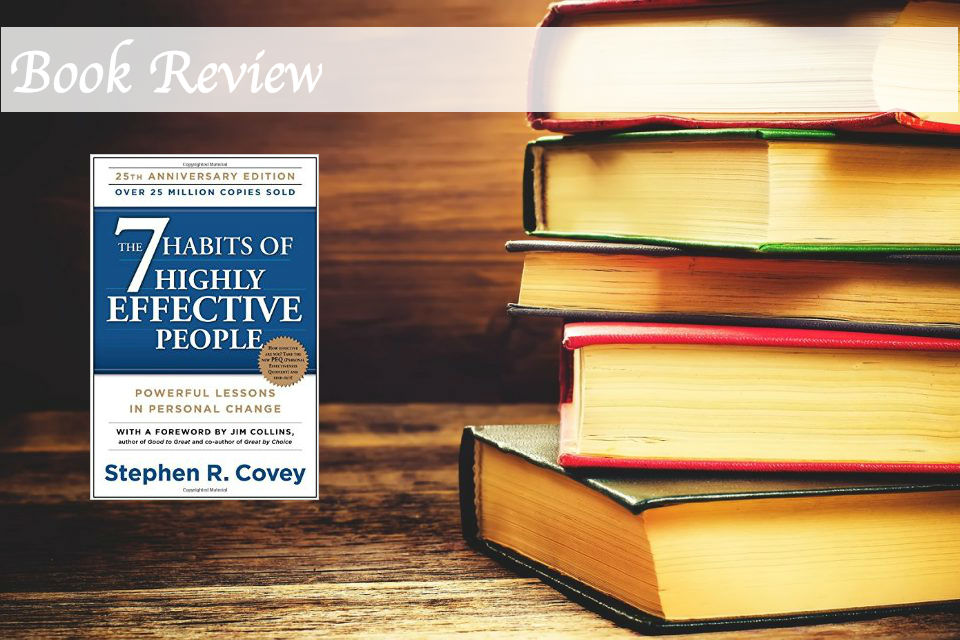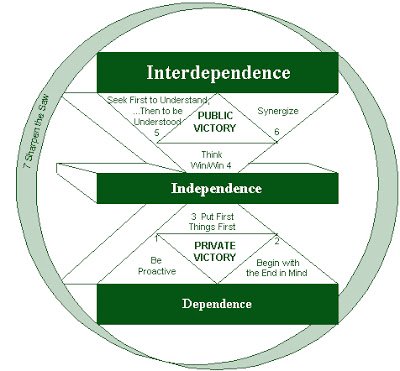Seven Habits of Effectiveness

I recently finished reading the bestseller “The 7 Habits of Highly Effective People” by ‘Stephen R Covey’. This book had captured many minds, mine being one of them. Covey introduces 7 habits that guides a person to lead a highly effective life.

Habit 2: Begin With The End In Mind
Habit 3: Put First Things First
Habit 4: Think Win/Win
Habit 5: Seek First to Understand, Then to Be Understood
Habit 6: Synergize
Habit 7: Sharpen The Saw
- First category consists of habits 1, 2 and 3 that would leverage a person’s character from being dependent to be independent (to attain private victory)
- Second category consists of habits 4, 5 and 6 that would leverage a person’s character from being independent to be interdependent (to attain public victory)
- The 7th habit which is for renewal of all the habits and continuous improvement
The habits should be developed in sequence from 1 – 7. You have to focus on improving one habit at a time in the sequence. Patience and dedication is highly required to attain these 7 habits. The book guides the reader in “How to be an effective person” through these 7 habits in 4 various dimensions of human life.
- Body
- Mind
- Emotions / Social
- Spiritual
The P/PC Balance
Habit 1 : Be Proactive
There is a difference in being proactive and just taking initiative. It also includes taking responsibility. Most of us are ‘reactive’ in nature. A reactive person’s attitude and behavior changes depending on external conditions like weather, the breakfast he/she had in the morning, how others treat them, the issue in the office etc…. A proactive person is driven by personal values and self-integrity. A proactive person act on a situation while a reactive person will be acted upon by the situation.
A proactive person considers the long-term benefits and not just the short term quick fixes. A proactive person focuses their efforts in the ‘circle of influence’ (things that we have control over) hence reducing the ‘circle of concern’ (things that we have no control but affects us). A reactive person focuses their efforts in the ‘circle of concern’ hence reducing the ‘circle of influence’. When everything starts going out of control, they start blaming other and/or other things.
Every action that we take standing in the ‘circle of influence’ has a corresponding consequences in the ‘circle of concern’. If we take the proactive actions to improve our actions, the consequences will also be sweet.
Habit 2 : Begin With The End In Mind
Several people, teams, organisations have invested lots of effort, time and money on things that turn out to be worthless. Several people feel that even though they are successful in their careers and family life there is always something missing; They are not satisfied. The reason for such feeling is that they failed to begin with the end in mind. Covey conveys that only proactive people can ‘begin with the end in mind’.
This habits might need a major re-alignment of personal preferences (Work, Family, Church, Money, Pleasure, etc..) to a correct set of principle. One of the ways to ‘begin with the end in mind’ is to write and regularly update a “personal mission statement” that becomes the set of principles. The mission statement is written from the center of desires. It is a list of things that could satisfy our lives’ dream and desire. It helps in setting our short-term and long term goals.
Habit 3 : Put First Things First
The 3 habit can only be practiced if we have the 2nd habit. Unless we know what we need, what our goals are, we cannot prioritize our tasks. Covey, explains that there are four generations of manager each generation having more control over their lives. The first generation practiced maintaining notes and checklists of tasks in hand. These notes were maintained per day basis. The second generation practiced maintaining calenders and appointment books that look ahead in time along with the daily notes and checklists. The third generation, that is most prominent today, adds the practice of prioritizing tasks. They also focus more on setting both short-term and long-term goals. Covey says there is an emerging fourth generation that give importance to satisfaction and self realization. They practice to spend time in the various dimensions of life mentioned at the beginning of this post.
Covey has an interesting way to explain the kinds of activities people spend their time through a 2 x 2 matrix. The matrix plots the activities according to urgency and importance against each other forming 4 quadrants as follows.
- Quadrant I: Activities that are urgent and important like Critical Tasks, project deadline around the corner, crisis, etc
- Quadrant II: Activities that are not urgent and important like exercise, reading, writing, relationship building, recreation, sports etc
- Quadrant III: Activities that are urgent and not important like picking up irrelevant phone calls, unnecessary meetings, attending to critical tasks in which we are not specialized in, etc
- Quadrant IV: Activities that are not urgent and not important like aimless surfing, procrastination and other time-wasters
Common people focus on activities in Quad I and III too much that they drift away to activities in IV neglecting activities in Quad II. Effective people focuses on activities in Quad I and II. By spending time on Quad II, it will eventually reduce Quad I activities. Like if you take time to exercise and have a healthy diet (Quad II activities) it would prevent you from getting a diseases and becoming weak (Leading to Quad I activities).
Habit 4 : Think Win/Win
Everybody has entirely different perspective to a problem and usually people comes up with a solution that might be either of the following:
- Win/Lose: People who thinks of solution that are favorable for only to self ignoring others concerns. These are the kind of people who has courage to act but do not have any concern for others.
- Lose/Win: People who easily agrees to solutions by others that might not be beneficial to them. These are the kind of people who has concern for others but do not has the courage to act.
- Lose/Lose: Some people think of making lose for others no matter if that results in lose to self. These are the kind of people who has neither concern for others nor has the courage to act.
- Win/Win: Effective people always go for Win/Win solutions. Whatever be the solution, it should be favorable for both the parties concerned. These are the kind of people who has high concern for others and has the courage to act.
Thinking Win/Win is a habit of finding solutions which are beneficial for both parties, where originally it looked as if no such agreements might be reached.
Habit 5 : Seek First to Understand, Then to Be Understood
How many times have we had discussions in which we keep on arguing to validate our point. What people never try to do is to ‘Listen’. Yes ,they might ‘hear’ what the other parties has to say but not ‘listen’. People hear to what the other party has to say with the intention to reply or justify their own statement and not to understand the core problem others are facing.
Everyone sees a problem in totally different perspectives. It is necessary to align our perspective with perspective of others to solve the problem effectively. Only Win/Win people take that extra effort to be calm and understand others. It is also important to have the courage ‘to be understood’ once he has understood the other party’s view. Covey presents this habit as the most important principle of interpersonal relations.






